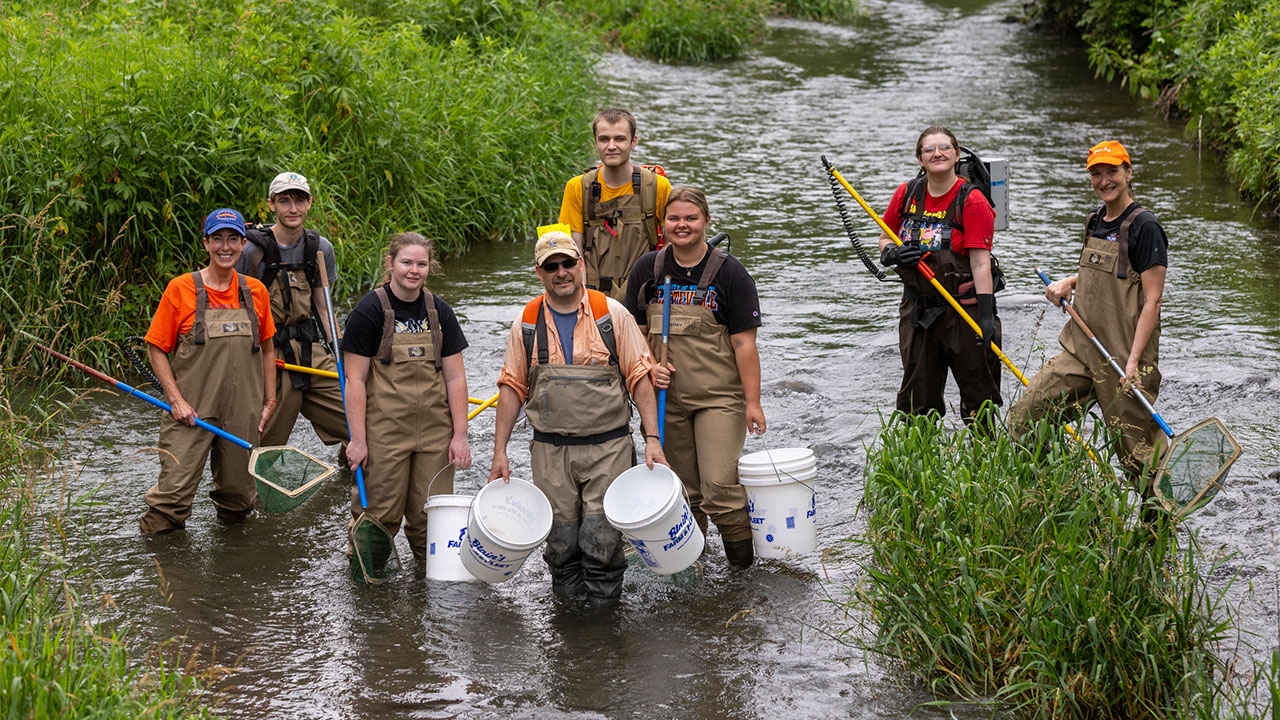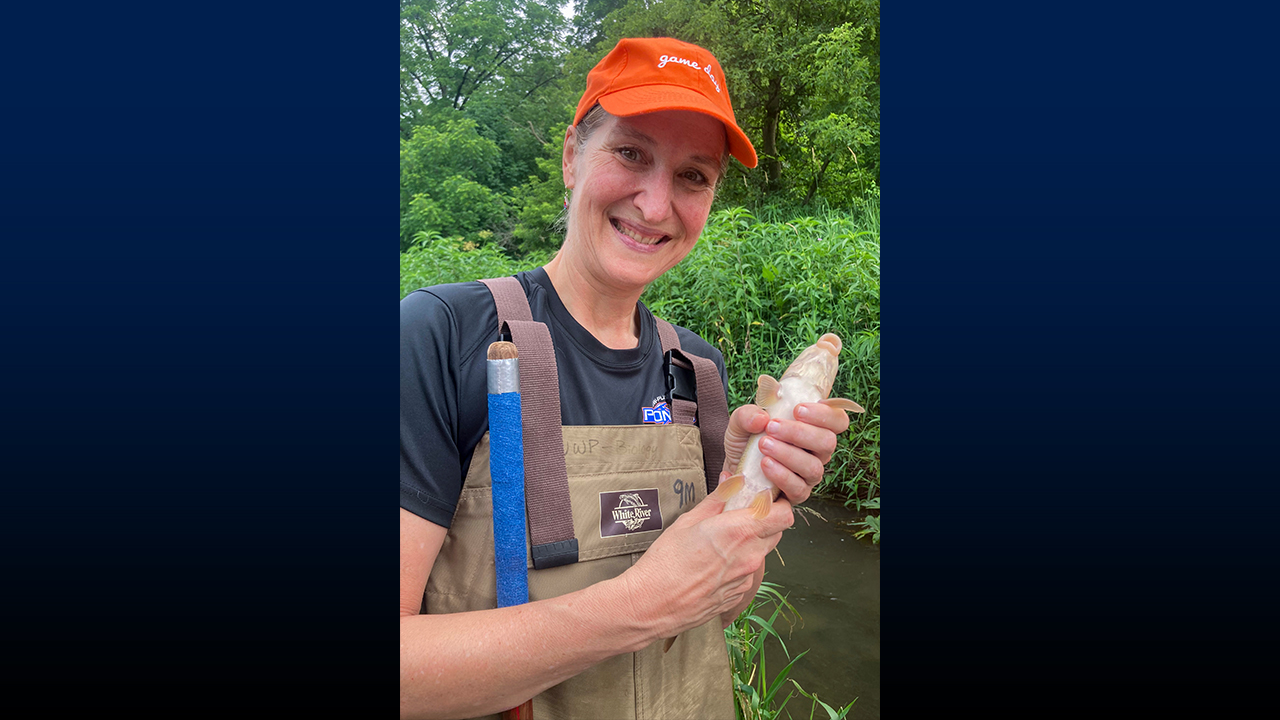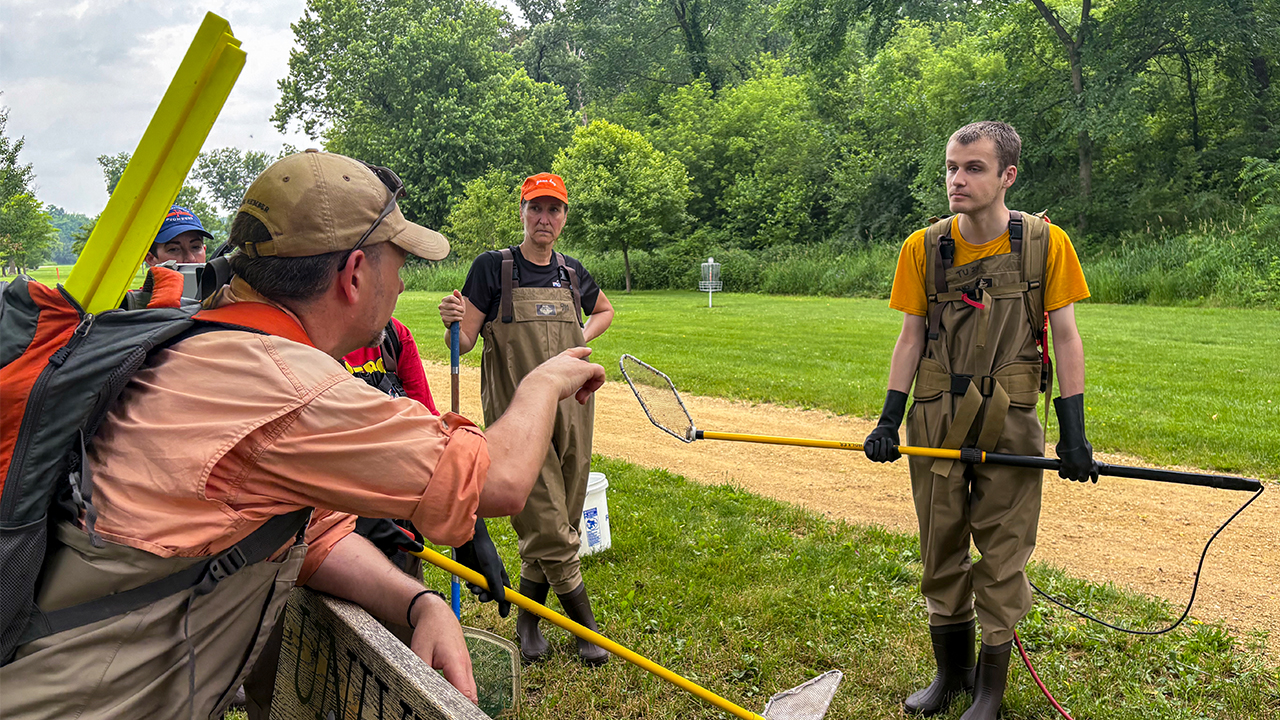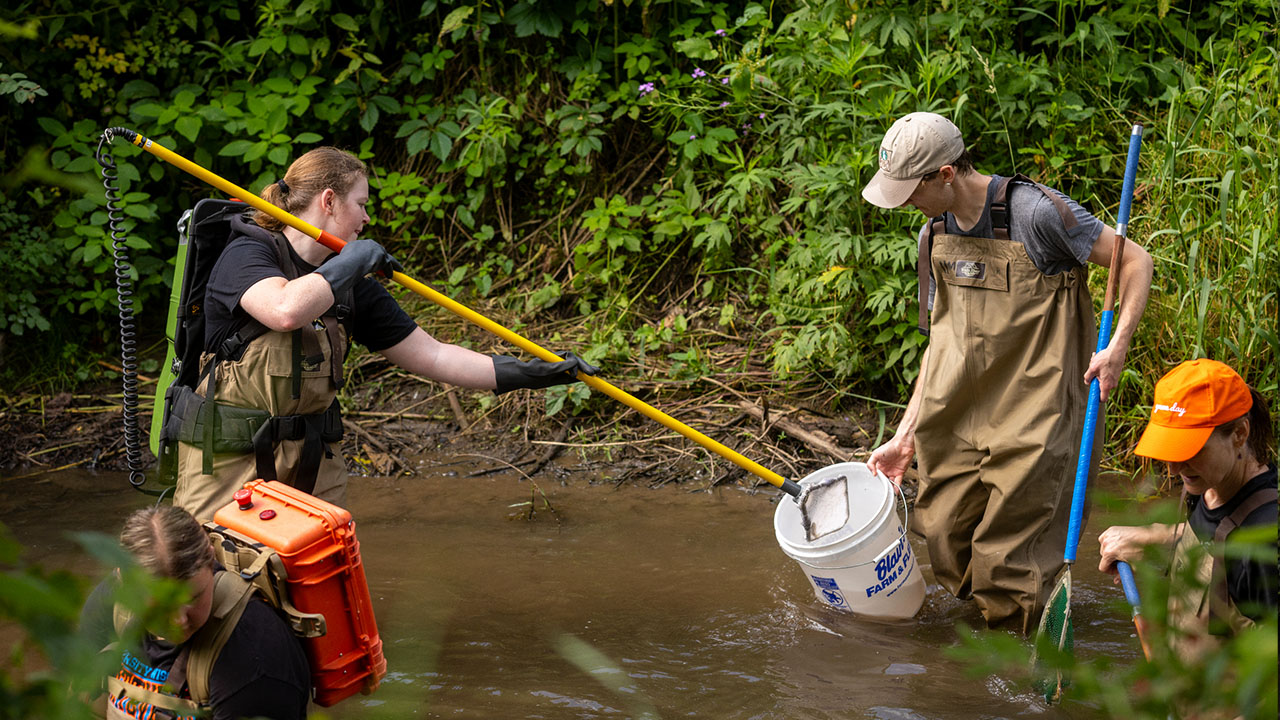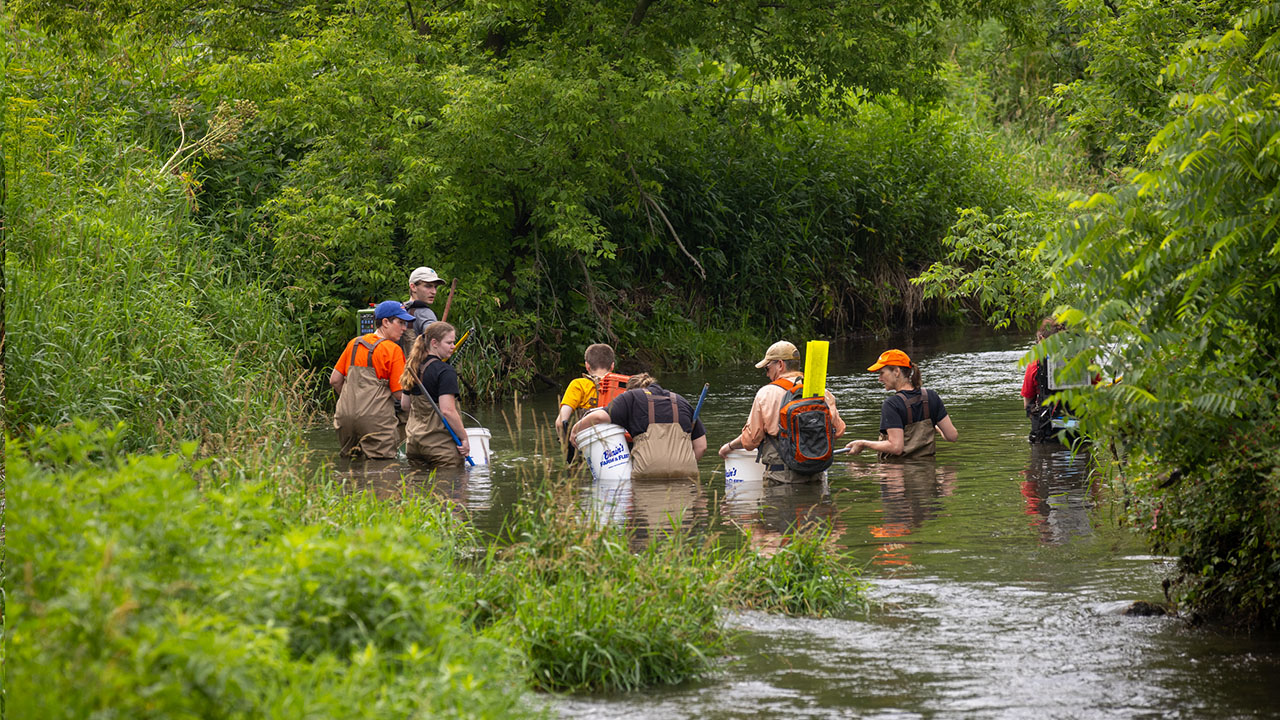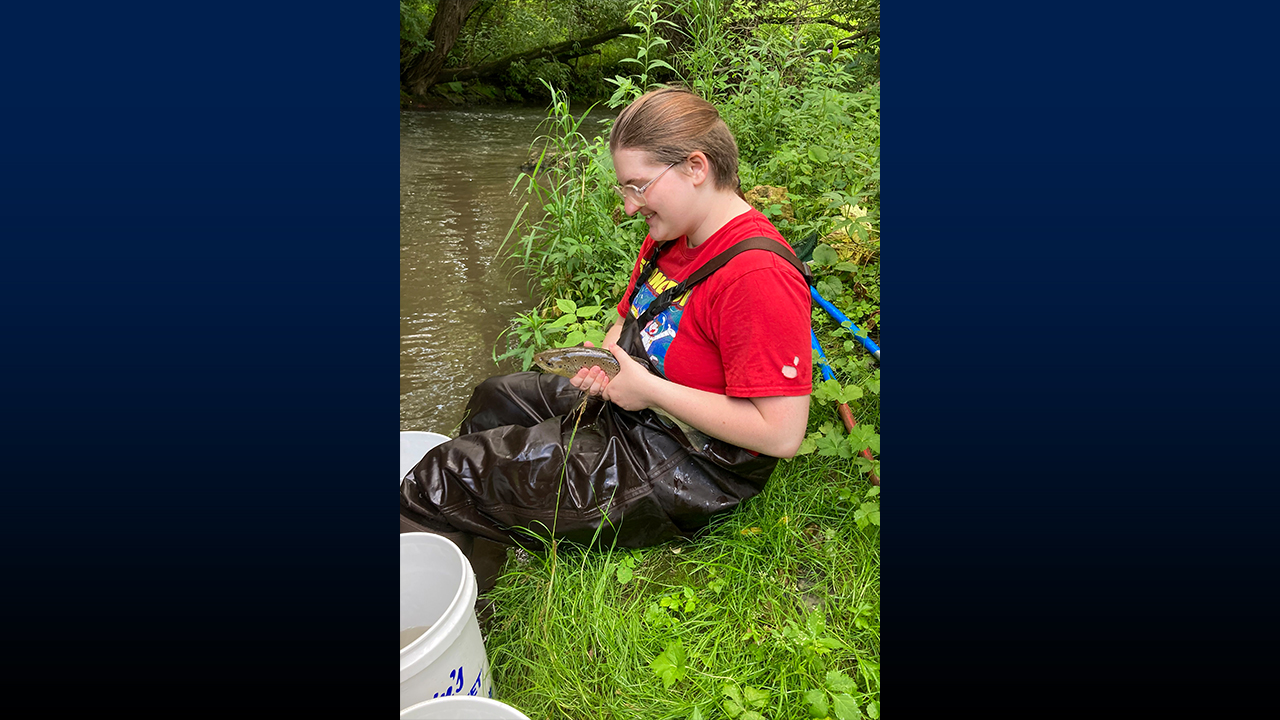Biology students at the University of Wisconsin-Platteville stepped into chest waders and took to the water to conduct fish sampling. Fish sampling provides a straightforward method to assess fish populations or communities, particularly in their habitats. It’s part of a broader collaboration with Trout Unlimited, a national nonprofit organization that focuses on conserving, protecting and restoring America’s coldwater fisheries and watersheds.
The research is led by UW-Platteville Biology Professor Dr. Kristopher Wright, who has been conducting long-term monitoring at 42 sites for the local chapter of Trout Unlimited. He describes streams as the barometer of the local environment, calling them the lifeblood of the surrounding ecosystem.
“If our streams are in trouble, it’s likely something in the greater system is in trouble,” Wright emphasized. “Water in our streams is like the lifeblood of our landscapes, as streams collect everything from the surrounding watershed. Observing streams helps us understand what’s happening in the wider world because they connect so many different habitats.”
On this trip to Rountree Branch Stream in Memorial Park, students were joined by Dr. Tammy Evetovich, chancellor, and Dr. Laura Reynolds, provost. Chancellor Evetovich, who received her undergraduate degree in biology, finds immense value in leaving the office and connecting with students.
“Every now and then we need to get out and do something like this to help us reinvigorate, reenergize and remember why we’re here,” she said. “At the University of Wisconsin-Platteville, we’re known for our high impact practices. Holding the fish in your hands and identifying it is so much more impactful than looking at it in a book.”
Chancellor Evetovich commends Wright for getting students outside and learning.
“Dr. Wright is fabulous,” she added. “He is the epitome of what a faculty member at UW-Platteville is like.”
What is unique to this research project is that the group used a technique called electrofishing. Electrofishing applies a direct electric current to shock the fish to temporarily immobilize it for easy capture. The Environmental Protection Agency says electrofishing, chosen for its advantages over other capture methods, is generally painless and stress-free for most fish, causing no lasting harm.
As for the students, they were getting used to the bulky fish shocking equipment. This session is practice in preparation for research at actual study sites in the months ahead.
“I am still learning, but you have to learn to swing the wand around, and sometimes you don’t know where the fish are,” said senior Noah Braun, from Mount Horeb, Wisconsin. An environmental science major with a minor in biology, Braun is supportive of UW-Platteville’s conservation efforts beyond the stream. “It’s important to be in touch with your own campus. I really like seeing the prescribed burns as well that we run on campus to keep it renewed. Fish sampling is another example of this as we keep an eye on our own area. It’s great practice as we go out in the field next month and do it elsewhere.”
The practice paid off as the haul netted Brown Trout, White Sucker, Creek Chub, Common Shiner, Smallmouth Bass, Johny Darter, Fantail Darter, and Blacknose Dace, which were sampled and studied.
“I’ve always been extremely fascinated with aquatic life, particularly invertebrates," said UW-Platteville sophomore Kai Cutler, from Belmont, Wisconsin. "I want to be a stream ecologist, but I want to stay near my family, and there are plenty of lakes and rivers in Wisconsin."
Cutler said she wants other students to know about the numerous research opportunities available at the university and how important it is to get involved.
Reynolds echoed that sentiment, adding, “One thing we are focused on is hands-on, applied learning at this institution. It’s become trendy nationally, but it’s something that UW-Platteville Pioneers engage in every day. Learning is more effective when we are as close to an authentic environment as possible.”
The knowledge students are gaining today could significantly shape and improve land-use practices in the years ahead. This research not only informs organizations like Trout Unlimited in their conservation decisions but also educates the public about the contents of streams, which affect what ends up on dinner tables.
“Although things have certainly improved, the last 200 years of land-use have been pretty hard on Wisconsin streams,” lamented Wright. “We’re all to blame, so instead of pointing fingers we need to work at positively impacting our streams’ functions and communities. Doing so can improve water quality, floodplain soils, fishing and recreation, and even local economies.”
Now that training is complete, the team will be going out to the study sites for the year and officially collecting data on habitat, invertebrates and fish to be shared with Trout Unlimited.
“The team is so committed, and Dr. Wright is getting students out in the field, learning and absorbing so much knowledge being out here,” said Chancellor Evetovich. “That is heartening for me. I’m going to go back to my office and think, ‘OK, let’s keep going. This is why we’re here!’”
Harry and Laura Nohr Chapter’s Stream Research Internship
The Harry and Laura Nohr Chapter of Trout Unlimited (Nohr Chapter) and the University of Wisconsin-Platteville established a unique partnership to examine stream restoration within southwestern Wisconsin. Undergraduate students are supported with stipends provided by the Nohr Chapter and mentored by a faculty member from the Biology Department. This partnership addresses the inability of resource agencies and conservation organizations to dedicate sufficient resources to monitor and evaluate restoration efforts. The partnership also provides a template to effectively address the current demand on undergraduates to acquire practical experience in addition to a strong academic foundation.

